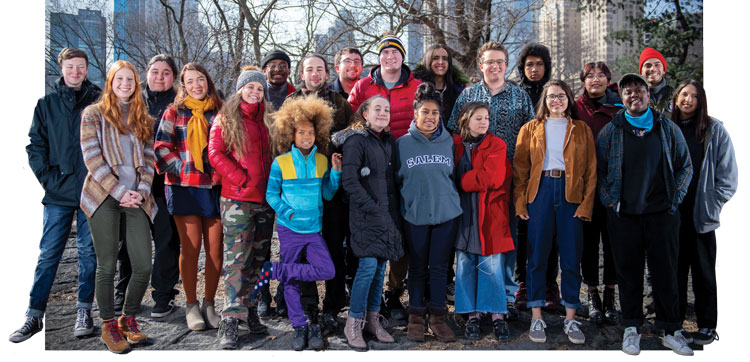Nation's first youth climate lawsuits to go to trial

Photo illustration by Elmarie Jara/Shutterstock.
Lander Busse, an 18-year-old high school senior who lives in Kalispell, Montana, sees evidence of climate change all around him. Busse and his younger brother, Badge, grew up fly-fishing for trout and hunting elk and deer in the Flathead River Valley. He says the impacts of a changing climate are impossible to miss, from differences in water levels to threats from wildfires.
“The stuff we see firsthand is lower or higher river levels—whether that’s due to drought or just drainage and runoff coming off the mountains too quick because of the spike in temperatures early in the spring,” Busse says. He noted that in the three days prior to speaking with the ABA Journal in early May, Kalispell had seen temperatures soar over 85 degrees, which he says is “unheard of.” “These are record highs for Montana,” he adds.
Wildfires also “hit home” when they once threatened Busse’s family’s house, forcing them to pack their bags and evacuate. “Luckily, the Forest Service got it under control,” he says.
Busse and his brother are among 16 young plaintiffs—ranging in age from 5 to 22—who filed suit in 2020 against the state of Montana, claiming that its energy policy—which focuses on the development and production of fossil fuels—violates a clause in the state’s constitution that guarantees a right to a “clean and healthful environment.”
When the First Judicial District Court in in Helena, Montana, hears Held v. State of Montana June 12, it will be the first youth climate lawsuit to go to trial in the U.S., with a string of other suits following not far behind.
Less than two weeks before Held’s start date, U.S. District Court Judge Ann Aiken ruled on June 1 that 21 youth plaintiffs in the climate case Juliana v. United States could amend their complaint to seek declaratory relief and also proceed to trial. Attorneys with Our Children’s Trust, an environmental public interest law firm focused on youth legal services based in Eugene, Oregon, filed the suit in the U.S. District Court for the District of Oregon in 2015.
Nate Bellinger, a lawyer with Our Children’s Trust and lead attorney on Held, says about 12 plaintiffs will take the stand during the two-week trial to share stories of how climate change has affected their lives, and will continue to do so. Bellinger says plaintiffs want the court to “declare that the state’s energy policy promoting fossil fuels is unconstitutional and enjoin the government from acting in a way to promote fossil fuels.”
“We’re seeking declaratory relief,” Bellinger says, noting his clients seek changes to the Montana Environmental Policy Act, which contains a clause preventing permits from considering the impacts of greenhouse gases. In 2021, District Judge Kathy Seeley ruled Held could move forward, but denied the plaintiffs’ request to pursue injunctive relief, finding that ordering the state to create a remedial plan to decrease its climate impact was beyond the court’s jurisdiction. Courts ruled similarly in Juliana, finding that remedial relief exceeded the court’s authority.
 Lander Busse is an 18-year-old high school senior who lives in Kalispell, Montana, and sees evidence of climate change all around him. Photo courtesy of Lander Busse.
Lander Busse is an 18-year-old high school senior who lives in Kalispell, Montana, and sees evidence of climate change all around him. Photo courtesy of Lander Busse.
Public trust
Held is part of a growing trend in climate-related litigation: shifting away from lawsuits targeting specific fossil fuel projects and toward a bigger-picture approach focusing on fundamental rights and broad violations of public trust.
The plaintiffs are using a newer strategy called Atmospheric Trust Litigation, developed in the past decade and pioneered by legal scholar Mary Wood at the University of Oregon. Wood says the courts should further expand the notion of public trust.
“The government is trustee of our vital natural resources, including waters and wildlife and the atmosphere,” Wood says. “And it is abrogating its duty as a sovereign trustee of these survival resources when it allows wholesale destruction to the extent that civilization is actually endangered.”
Historically in U.S. caselaw, public trust has been narrowly interpreted in relation to navigable waters, most notably in Illinois Central Railroad Company v. Illinois, in which the U.S. Supreme Court ruled in 1892 that shorelines couldn’t be given away to private companies.
And in 1983, a California Supreme Court case, National Audubon Society v. Superior Court, extended public trust to the protection of Mono Lake, arguing that approving permits for activities that degraded the ecological status of the lake violated the public trust. The Audubon ruling expanded the notion of public trust beyond “navigable waters” to the total natural resource value of a body of water.
Wood’s theory was applied unsuccessfully to a host of lawsuits filed in all 50 states by Our Children’s Trust, culminating in Juliana, which alleges the U.S. government’s failure to enact policies to address climate change violates the plaintiffs’ constitutional rights to equal protection as well as violating the public trust.

Our Children’s Trust filed Juliana v. United States on behalf of 21 children from 10 states in what has been referred to as “the biggest case on the planet.” Photo by Robin Loznak.
State strategy
Ghislaine Torres Bruner, a Denver attorney who chairs the ABA’s Oil and Gas Committee, believes Held doesn’t have much merit, arguing that it’s simply one of a slew of citizen lawsuits targeting oil and gas that have failed to gain traction with the courts. “It was intended to shut down fossil fuel development,” she says.
Critics also say Held would hamstring Montana’s economy, which is heavily reliant upon the production and export of coal, oil and methane gas.
Republican Gov. Greg Gianforte’s office declined to comment specifically on the case, but in an email statement, spokesperson Kaitlin Price said, “We must focus on American innovation and ingenuity, not costly, expansive government mandates, to address our changing climate. The United States must also have an all-of-the-above energy policy, like Montana does, to make our country energy independent and secure again.”
The state moved to dismiss the case in 2021, and, according to Bellinger, also attempted to depose testimony from all of the plaintiffs—including a 5-year-old.
But Bellinger says they have a solid foundation to make their argument: Montana’s state constitution, which was amended at a constitutional convention in 1972, includes a clause that identifies “inalienable rights” that include “a right to a clean and healthful environment.”
Bellinger, who wrote a 2022 law review article on Montana’s constitutional convention and will be seeking testimony from those involved in its creation, says there was no mistaking what the delegates intended when adding that clause. “They were looking to the future knowing what they were going to do would have implications for their kids and their grandkids,” he says.
Michael Gerrard, a Columbia University law professor and founder-director of the Sabin Center for Climate Change Law, says the shift toward litigation in states with environmental provisions in their constitutions is significant. “That makes all the difference,” Gerrard says. “In Juliana, there was an effort to have the U.S. Constitution involved…But here, the state constitution is completely different.”
The plaintiffs’ attorneys originally sought changes to Montana’s State Energy Policy (first signed into law in 1993), which promotes fossil fuel expansion, and to a provision added to the Montana Environmental Policy Act (in 2011) that forbids environmental permits from considering “actual or potential impacts that are regional, national, or global in nature.”
Complicating matters, however, Montana’s state legislature, during its 2023 session, repealed the entire State Energy Policy, which Bellinger says was an attempt to undercut Held.
In April, the legislature also passed a bill explicitly stating that the Montana Environmental Policy Act permits for fossil fuel projects cannot consider greenhouse gas emissions when analyzing impacts. And state Rep. Steve Gunderson floated the idea of introducing a bill that would amend the constitution to revise the environmental rights clause, but that effort stalled.
Gerrard, also a former chair of the ABA Section on Environment, Energy & Resources, speculates that the state will also argue that its contributions to climate change are minor. “Or they may argue that Montana is not responsible for the emissions caused by people who take coal or oil or gas from Montana and burn it in other states.”
He also notes that the composition of the U.S. Supreme Court makes pursuing climate litigation at the federal level risky. “Being in state court under state law makes a great deal of sense right now.”
Looking ahead
Montana is one of six states—including Hawaii, Illinois, Massachusetts, Pennsylvania and Rhode Island—that specify environmental rights in their state constitutions
Those rights are being tested in another lawsuit in Hawaii led by Our Children’s Trust, in which 14 young plaintiffs allege the state’s transportation department is violating the state’s constitutional provisions concerning a clean environment. A judge ruled the trial can proceed and will take place in September. Our Children’s Trust additionally has active suits in Utah and Virginia.
Meanwhile in Montana, when asked if he’s nervous about testifying, Busse has an unflappable, no-nonsense response. “I want to let them know directly how my life has been impacted. And all the plaintiffs want to do the same.”
“We’re the generation that’s going to be affected most by this,” Busse adds, “because a lot of the older generations will be dead and gone by the time the implications really start to set in.”
Write a letter to the editor, share a story tip or update, or report an error.


